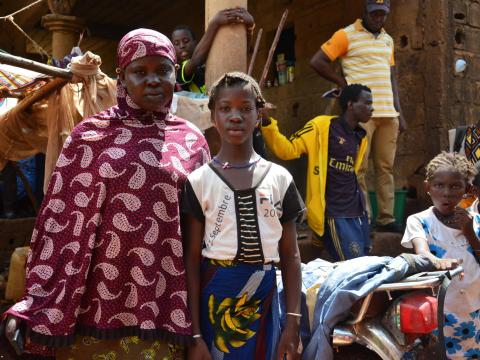‘Back then, we did not have to beg for food’ – Alimatou recalls life before conflict

Produced by: Fousseni Koné - Emergency Communications Officer (Intern)
The insecurity in the central and northern regions of Mali continues to cause violence and food insecurity for families and despair for children. Alimatou, a nine-year-old girl who recently fled violence in the district of Bandiagara with a large number of internally displaced persons for Sévaré, explains.
“We are here - Sévaré - because of the conflict led by the armed group. We had to leave everything behind to come here where we would feel a little more secure”, she says.
World Vision’s team in Mali joined forces with other Non-Governmental Organisations (NGOs) and local authorities to conduct a rapid assessment to identify and register the needs of displaced families. The results of the assessment indicated that 64% of the 633 internally displaced families in 112 households were children such as little Alimatou.
“We arrived here on foot because the armed groups threatened us and took everything from us, including our crops and livestock. Since our arrival, we only eat once a day. Most of the time I fall asleep hungry because there is no food”, shares Alimatou.
Before the insecurity, her life was very different.
“We were very happy because we did not lack anything before. We did not have to buy or beg for food because we had land to cultivate. Everyone you can see around this site had enough food after harvest that could feed them for a long time”, recalls Alimatou in tears during our exchange.
She also shared with us that apart from the lack of food for them, they have no better infrastructure for sanitation and drinking water. As a result, men and women use the same toilets at the hosting site.
“In addition to the lack of food, we also need clean water to drink and a toilet because we only have one toilet to use here. Most of the time, people are lining up to meet their toilet needs”, shares the little girl.
On the other hand, Laya, Alimatou's 37-year-old mother faced with displacement and several difficulties such as the inability to cover her little girl's needs, explains that in such a situation, some people would prefer to flee to the big cities where they will develop strategies to overcome the difficult period. However, for her, this option is unsuitable because children are most of the time confronted with begging, banditry, harassment, or even rape for girls.
“When you experience such a situation, some people flee to the big cities to survive; but I did not take this option because I thought that we would be safe here and my daughter would not suffer any form of violence in Sévaré”, Laya reveals.
Alimatou's mother regrets that her daughter was unable to go to school due to the conflict that affected their lives. She explains that the schools in their village have been closed for three years.
“This conflict has seriously affected the future of many children in the village of Piron; this is the third year that our schools have been closed. Alimatou was about to start school when this situation arose”, adds Laya.
“My mother told me that she wanted [me] to complete school. I also would have liked to go to school. I hope the conflict will end so that I can go to school”, Alimatou shares.
Given the current living conditions of these families, World Vision’s response team plans to support the 633 internally displaced families, including that of Alimatou, with food and NFI (non-food items) over the next few months.
“It is difficult for us parents to see children sleeping hungry. Unfortunately, we do not have enough to offer without relying on the support of others. I really wish we could have food for them”, Laya concludes.